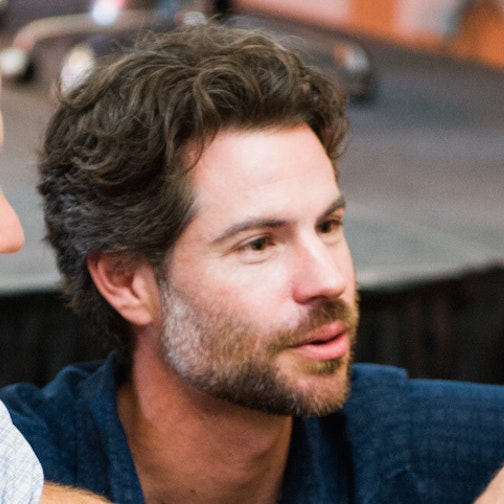‘Break Through’ The Book
From the Death of Environmentalism to the Politics of Possibility
-
-
Share
-
Share via Twitter -
Share via Facebook -
Share via Email
-
Greeted by controversy on its publication, Break Through soon became recognized — as much by those who criticized it as embraced it — as a book of historical significance. Kyoto, cap and trade, and sustainable development in the Amazon have failed. The planet is getting hotter, faster, and the old environmental solutions cannot save us. What’s required is not that we constrain human power but rather unleash it. In opposition to regulation-focused greens and anti-government conservatives, the authors call for epic government investment in a new economy, and herald a “politics of possibility” — one of hope and renewal — to overcome global warming and allow America to become, once again, a great nation.
Green Book Award Winner, 2008
Authors, Heroes of the Environment, 2008
“Prescient.” — Time
"Convincing, resonant and hopeful." — Publishers Weekly (Starred Review)
“To win, Nordhaus and Shellenberger persuasively argue, environmentalists must stop congratulating themselves for their own willingness to confront inconvenient truths and must focus on building a politics of shared hope rather than relying on a politics of fear.”
— New York Times
“If heeded, Nordhaus and Shellenberger's call for an optimistic outlook — embracing economic dynamism and creative potential — will surely do more for the environment than any U.N. report or Nobel Prize.”
— Wall Street Journal
THE CHARACTERS
Chico Mendes
 Chico Mendes was great labor and community activist who environmentalists tend to remember as motivated by his love of nature. In truth he had more basic concerns: helping miserably poor people eke out a better living in the forest. He was murdered by violent landlords - the local aristocracy — for his work New York Times reporter Andrew Revkin observed in his book, the Burning Season, that "His demands were for schools and jobs and health care, hardly a green agenda. This overlap with environmental preservation brought the union man to the attention of conservationists who shared his goal of preserving the rain forest, but for far different reasons."
Chico Mendes was great labor and community activist who environmentalists tend to remember as motivated by his love of nature. In truth he had more basic concerns: helping miserably poor people eke out a better living in the forest. He was murdered by violent landlords - the local aristocracy — for his work New York Times reporter Andrew Revkin observed in his book, the Burning Season, that "His demands were for schools and jobs and health care, hardly a green agenda. This overlap with environmental preservation brought the union man to the attention of conservationists who shared his goal of preserving the rain forest, but for far different reasons."
Revkin quotes Mendes yelling back at a TV documentary that depicted the rubber tapper as an environmentalist. "I'm not protecting the forest because I'm worried that in twenty years the world will be affected," Mendes said. "I'm worried about it because there are thousands of people living here who depend on the forest-and their lives are in danger every day." The successor to Mendes as the head of the rubber tappers union, Osmarino Amáncio Rodrigues, so feared that environmentalism was distracting attention away from the need for land reform that he denounced "empty environmentalism" in a provocative 1990 essay titled "The Second Assassination of Chico Mendes."
Henry David Thoreau
 In his love of the outdoors, his austerity and asceticism, and his Calvinist valorization of personal sacrifice, Henry David Thoreau is a hero to environmentalists. But we should not forget that his fierce individualism was made possible by his material wealth — the precondition to ecological concern for all humans. Thoreau was all too aware of his privilege. Indeed, he famously invented civil disobedience after refusing to pay his taxes in protest of slavery and the Mexican-American War.
In his love of the outdoors, his austerity and asceticism, and his Calvinist valorization of personal sacrifice, Henry David Thoreau is a hero to environmentalists. But we should not forget that his fierce individualism was made possible by his material wealth — the precondition to ecological concern for all humans. Thoreau was all too aware of his privilege. Indeed, he famously invented civil disobedience after refusing to pay his taxes in protest of slavery and the Mexican-American War.
Lest the centuries dull us into remembering Thoreau as some sort of mild-mannered park ranger, we open Part I of Break Through with a quote from Thoreau breaking away from the earlier generation:
"The greater part of what my neighbors call good I believe in my soul to be bad, and if I repent of any thing, it is very likely to be my good behavior. What demon possessed me that I behaved so well? You may say the wisest thing you can, old man-you who have lived seventy years, not without honor of a kind-I hear an irresistible voice which invites me away from all that. One generation abandons the enterprises of another like stranded vessels." (Walden, 1854)
Thoreau was actually much harsher than even we quoted him being — starting with his famous, "The Mass of men lead lives of quiet desperation" riff. His harshest words against the older generation come in first few pages of Walden:
"What old people say you cannot do you try and find that you can. Old deeds for old people, and new deeds for new. . . Practically, the old have no very important advice to give the young, their own experience has been so partial, and their lives have been such miserable failures, for private reasons, as they must believe; and it may be that they have some faith left which belies that experience, and they are only less young than they were. I have lived some thirty years on this planet, and I have yet to hear the first syllable of valuable or even earnest advice from my seniors."
Abraham Maslow
 In 1943, the American psychologist Abraham Maslow wrote a seminal paper called "A Theory of Human Motivation." In it he introduced the theory that humans have a "hierarchy of needs," a deceptively simple concept that many of us can still remember seeing as a multicolor pyramid in our high school social studies classes. At the bottom of the pyramid there were the basic material needs: food, shelter, and security. Above those were esteem, belonging, and status needs, and above them were "being" needs, such as purpose, self-creation, and fulfillment. Maslow argued that once we have met the lower material needs, new and higher needs emerge that demand our attention. Sociologists today describe these higher needs as "postmaterial," since they emerge only after our basic material needs have been met.
In 1943, the American psychologist Abraham Maslow wrote a seminal paper called "A Theory of Human Motivation." In it he introduced the theory that humans have a "hierarchy of needs," a deceptively simple concept that many of us can still remember seeing as a multicolor pyramid in our high school social studies classes. At the bottom of the pyramid there were the basic material needs: food, shelter, and security. Above those were esteem, belonging, and status needs, and above them were "being" needs, such as purpose, self-creation, and fulfillment. Maslow argued that once we have met the lower material needs, new and higher needs emerge that demand our attention. Sociologists today describe these higher needs as "postmaterial," since they emerge only after our basic material needs have been met.
Environmentalism and other progressive social movements of the 1960s were born of the prosperity of the postwar era and the widespread emergence of higher-order postmaterialist needs. As Americans became increasingly wealthy, secure, and optimistic, they started to care more about problems such as air and water pollution and the protection of the wilderness and open space. This powerful correlation between increasing affluence and the emergence of quality-of-life and fulfillment values has been documented in developed and undeveloped countries around the world.
Of course, these universal human needs express themselves as strikingly different social values, and we must thus understand both. By values we mean, very broadly, those fundamental concerns and beliefs that comprise our worldviews and the different ways of making sense of ourselves. An individual's core values are formed early in life and evolve slowly over time as we go through major life events. Throughout this book we will refer to the social values research that we and others have conducted. Nothing is more central to our book than our contention that for any politics to succeed, it must swim with, not against, the currents of changing social values.
While some social scientists and psychologists quibble with elements of Maslow's hierarchy, the underlying concept-that there exists a universal hierarchy of human needs- remains to this day the consensus among social scientists.
Mahalia Jackson
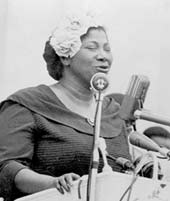 Beyond being one of the greatest gospel singers of all times, Mahalia Jackson shaped history during the civil rights movement. King's famous "I have a dream" speech was, in fact, an "I have a nightmare" speech until Jackson, King's friend, yelled from the back of the dais: "Tell them about your dream, Martin!" It was a shout that changed the world. King stammered, and the "queen of gospel" yelled the same thing again, and King began what is today known as the "I have a dream" speech.
Beyond being one of the greatest gospel singers of all times, Mahalia Jackson shaped history during the civil rights movement. King's famous "I have a dream" speech was, in fact, an "I have a nightmare" speech until Jackson, King's friend, yelled from the back of the dais: "Tell them about your dream, Martin!" It was a shout that changed the world. King stammered, and the "queen of gospel" yelled the same thing again, and King began what is today known as the "I have a dream" speech.
You can read about the incident in Taylor Branch's Parting the Waters - and click here to listen to an NPR segment about the event.
Richard Nixon
 We tend to remember the late sixties and early seventies through the prism of street riots and the bloodshed of the Vietnam War. We tend to think of Richard Nixon as oafish and bigoted. But Nixon was also caught up in the spirit of the times, and in his 1970s State of the Union he successfully co-opted the spirit of environmentalism. It was a speech that reflected the optimistic mood of newly prosperous Americans in the postwar period.
We tend to remember the late sixties and early seventies through the prism of street riots and the bloodshed of the Vietnam War. We tend to think of Richard Nixon as oafish and bigoted. But Nixon was also caught up in the spirit of the times, and in his 1970s State of the Union he successfully co-opted the spirit of environmentalism. It was a speech that reflected the optimistic mood of newly prosperous Americans in the postwar period.
"The great question of the seventies is, shall we surrender to our surroundings, or shall we make our peace with nature and begin to make reparations for the damage we have done to our air, to our land, and to our water?"
Ilzamar Mendes
 The destruction of the Amazon is, for the vast majority of Brazilians, far less alarming than the fear of losing their jobs, their life savings, or their lives on the streets of dangerous cities like Rio de Janeiro and São Paulo. The same is doubly true for the desperate people who eke out a living in the far Amazon. Heads of cattle - a good indicator of deforestation — in Chico Mendes's home state of Acre went from 26 to 64 million between 1990 and 2003. Nearly fifteen years after the UN conference in Rio, the Rousseauian dream of extractive reserves as communities of peasants, rubber tappers, and Indians working and living in harmony with nature has faded. Every extractive reserve in Acre is today grazing cattle. When Veja magazine reporter Leonardo Coutinho visited the Chico Mendes Extractive Reserve in Acre, he discovered that even Chico Mendes's widow, Ilzamar Mendes, had a herd of them. To those who believe overcoming global warming will be easy: remember the Amazon.
The destruction of the Amazon is, for the vast majority of Brazilians, far less alarming than the fear of losing their jobs, their life savings, or their lives on the streets of dangerous cities like Rio de Janeiro and São Paulo. The same is doubly true for the desperate people who eke out a living in the far Amazon. Heads of cattle - a good indicator of deforestation — in Chico Mendes's home state of Acre went from 26 to 64 million between 1990 and 2003. Nearly fifteen years after the UN conference in Rio, the Rousseauian dream of extractive reserves as communities of peasants, rubber tappers, and Indians working and living in harmony with nature has faded. Every extractive reserve in Acre is today grazing cattle. When Veja magazine reporter Leonardo Coutinho visited the Chico Mendes Extractive Reserve in Acre, he discovered that even Chico Mendes's widow, Ilzamar Mendes, had a herd of them. To those who believe overcoming global warming will be easy: remember the Amazon.
Christopher Foreman
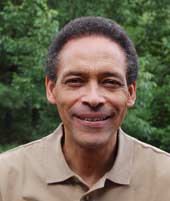 In 1993, when Brookings scholar Christopher Foreman first heard the claims of the environmental justice movement, he was shocked, and decided to write a book. Looking back, he told us, "I quickly discovered that a lot of the things I was reading in the environmental literature were not squaring very well with claims from the EJ community."
In 1993, when Brookings scholar Christopher Foreman first heard the claims of the environmental justice movement, he was shocked, and decided to write a book. Looking back, he told us, "I quickly discovered that a lot of the things I was reading in the environmental literature were not squaring very well with claims from the EJ community."
Foreman, the author and editor of books on public health, class, and race, spent the next five years carefully sifting through the evidence and writing a book. Today, The Promise and Peril of Environmental Justice, published in 1998, remains one of the most important books ever written on environmental justice. At just 191 pages long, Promise and Peril sheds far more light on the politics of race, class, and environment than books on environmental justice three times its length.
In the book, Foreman concludes, "Empirical support for claims of disproportionate pollution impacts and discriminatory regulatory enforcement is actually much weaker than environmental justice advocates usually admit." As a result, the EJ movement "probably directs community attention away from those problems posing the greatest risks and may therefore have the ironic effect of undermining public health in precisely those communities it endeavors to help."
Geoffrey Canada
 Geoffrey Canada, who authored an acclaimed memoir, Fist Stick Knife Gun, about growing up as a street tough, is famous for setting his sights high — to some, impossibly high. Canada and the Harlem Children's Zone are justly famous for their intensive and complex interventions around economic development, violence prevention, and health.
Geoffrey Canada, who authored an acclaimed memoir, Fist Stick Knife Gun, about growing up as a street tough, is famous for setting his sights high — to some, impossibly high. Canada and the Harlem Children's Zone are justly famous for their intensive and complex interventions around economic development, violence prevention, and health.
In the asthma project, Canada and his team arranged for doctors, social workers, nurses, and others to repeatedly visit families and make typical health interventions-such as accompanying them to medical appointments and helping administer medicines to their children-as well as atypical interventions, such as repairing broken windows and holes in walls and replacing dusty carpets and furniture.
The program was wildly successful. The program — and its multifactorial approach to asthma, which deals not just with kids but also with their parents, teachers, relatives, and others — is today considered by the CDC to be a model for other childhood illnesses, from obesity to diabetes. It is also, we argue in Break Through, an alternative to the brand of special interest liberalism and environmentalism.
Bobby Kennedy
 After Bobby Kennedy attacked Cape Wind in a December 2005 New York Times op-ed — it was perfectly timed to coincide with the introduction of legislation to kill Cape Wind by right-wing anti-environmental Senator Don Young (R-AK) — it looked as though Cape Wind might soon die a certain death. We looked around and realized that the leaders of the environmental movement would neither speak out nor do much to defend Cape Wind (the Sierra Club declared itself "neutral," and Kennedy is a major fundraiser for NRDC). Virtually alone, local environmental activists and Greenpeace defended Cape Wind. We joined Bill McKibben, Ross Gelbspan, Jon Isham, and other writers in speaking out.
After Bobby Kennedy attacked Cape Wind in a December 2005 New York Times op-ed — it was perfectly timed to coincide with the introduction of legislation to kill Cape Wind by right-wing anti-environmental Senator Don Young (R-AK) — it looked as though Cape Wind might soon die a certain death. We looked around and realized that the leaders of the environmental movement would neither speak out nor do much to defend Cape Wind (the Sierra Club declared itself "neutral," and Kennedy is a major fundraiser for NRDC). Virtually alone, local environmental activists and Greenpeace defended Cape Wind. We joined Bill McKibben, Ross Gelbspan, Jon Isham, and other writers in speaking out.
And all of it worked. Kennedy was forced to oppose the legislation publicly and, apparently, killed the Young legislation. Cape Wind was saved - at least for now.
Kennedy's NIMBY alliance of wealthy, part-time homeowners has been effectively countered by a local Cape Cod organization, Clean Power Now, which boasts 6,500 members. Were it not for their commitment to a genuinely ecological politics, Cape Wind would have been killed long ago. Their slogan? "It's Not the View - It's the Vision."
Thomas Kuhn
 The risk of writing about Thomas Kuhn is many people have decided that Kuhn's concept of the paradigm shift is cliché. Fine. If Kuhn is a cliché, we're happy to be clichéd with him.
The risk of writing about Thomas Kuhn is many people have decided that Kuhn's concept of the paradigm shift is cliché. Fine. If Kuhn is a cliché, we're happy to be clichéd with him.
Kuhn's masterpiece, The Structure of Scientific Revolutions, written in 1962, the same year as Silent Spring, is a scientific and historical classic. It is a book about how science is done by humans, not gods. It describes "normal scientists" — the majority of scientists — as conservative, not bold, conformist, not creative. But Kuhn also argues that there are revolutionary scientists — think Galileo and Einstein — that violently break from the old paradigms to create new ones.
Revolutionary science, Kuhn argued, emerges when the established paradigm has an increasingly difficult time accounting for "anomalies." Science is always dealing with anomalies, Kuhn pointed out, but when they become too prevalent or too persistent they can throw normal science into crisis. Faced with a growing crisis, the vast majority of scientists respond by jerry-rigging the old paradigm to explain the anomalies. As the crisis deepens, the rules defining normal scientific practice loosen, and competing explanations of the crisis emerge. Often, the new paradigm emerges from both the crisis and the attempts to deal with it-eventually making the older paradigm irrelevant.
Structure is a book about how we humans are made by history and society, holding unconscious beliefs and assumptions that we didn't rationally choose. And it emphasized that the ways in which we experience the very nature of the world is constantly up for revision and change.
Frans de Waal
 Against those who see humans as merely smarter and more violent apes, stands the work of the primatologist, Frans de Waal:
Against those who see humans as merely smarter and more violent apes, stands the work of the primatologist, Frans de Waal:
I call the human species the most bipolar ape, meaning that we go beyond chimps in our violence, which is systematic and often results in thousands of dead, and we go beyond the bonobo in our empathy and love for others, so that human altruism is truly remarkable. . . [W]e should look at both of these close relatives, and consider that human nature is not all bad, nasty and selfish. It includes lots of positive tendencies. We are endowed with ways to hold aggression in check and to empathize, even with [our] enemies.
Rick Warren
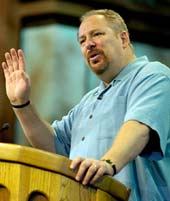 Anyone who doubts how wide the gulf between red and blue America has become should consider that Rick Warren had sold 23 million copies of The Purpose-Driven Life before even the most well-read of liberals learned that he had become the Billy Graham of the early twenty-first century. Warren's success is largely the result of having created a church that helps people get their needs for belonging and fulfillment met. Saddleback is a postmaterialist church for a postindustrial economy and, as such, it holds many lessons for how to create a pre-political institution that meets our needs.
Anyone who doubts how wide the gulf between red and blue America has become should consider that Rick Warren had sold 23 million copies of The Purpose-Driven Life before even the most well-read of liberals learned that he had become the Billy Graham of the early twenty-first century. Warren's success is largely the result of having created a church that helps people get their needs for belonging and fulfillment met. Saddleback is a postmaterialist church for a postindustrial economy and, as such, it holds many lessons for how to create a pre-political institution that meets our needs.
Small groups are "the church" more than the building where weekly services are held. In signing up for a small group one must commit to participate for roughly two months, but church officials say that 70 percent of the members continue for years beyond that. Today, an estimated forty million Americans are involved in a religious small group. What Warren has done, brilliantly, is maximize the strength of weak ties through his congregation, the ultimate hub of multiple networks, and convert some of those weak ties into strong ties through his small groups. "People are not looking for friendly churches," Warren says on his Web site, Pastors.com, "they are looking for friends.":
Richard Florida
 In documenting the decline of social capital, Putnam directed our attention to something important, but he also missed something equally profound, and that was the rise of new kinds of social capital, networks, and social ties. In The Rise of the Creative Class, Richard Florida documented the increasing numbers of Americans working in the new knowledge and service economies who "share a common creative ethos that values creativity, individuality, difference, and merit."
In documenting the decline of social capital, Putnam directed our attention to something important, but he also missed something equally profound, and that was the rise of new kinds of social capital, networks, and social ties. In The Rise of the Creative Class, Richard Florida documented the increasing numbers of Americans working in the new knowledge and service economies who "share a common creative ethos that values creativity, individuality, difference, and merit."
These Americans, Florida found, have fewer of the strong social ties that authors like Bowling Alone's Robert Putnam valorizes. But they also have many more "weak ties," which are precisely what the creative class wants and needs to break free of more traditional, stifling forms of community. Traditional notions of what it meant means to be a close, cohesive community and society tend to inhibit economic growth and innovation. "Where strong ties among people were once important," Florida writes, "weak ties are now more effective. Where old social structures were once nurturing, now they are restricting… People want diversity, low entry barriers and the ability to be themselves.
Rachel Carson
 Rachel Carson opened her 1962 Silent Spring with a terrible prophecy: "Man has lost the capacity to foresee and to forestall. He will end by destroying the earth." The words belong not to her but to the man to whom she dedicated the book, Albert Schweitzer.
Rachel Carson opened her 1962 Silent Spring with a terrible prophecy: "Man has lost the capacity to foresee and to forestall. He will end by destroying the earth." The words belong not to her but to the man to whom she dedicated the book, Albert Schweitzer.
It is this reality-human agency-that most bothers environmentalists like Carson. For her, human attempts to control Nature inevitably end in tragedy.
Carson closes Silent Spring with these three grim sentences:
The "control of nature" is a phrase conceived in arrogance, born of the Neanderthal age of biology and philosophy, when it was supposed that nature exists for the convenience of man. The concepts and practices of applied entomology for the most part date from the Stone Age of science. It is our alarming misfortune that so primitive a science has armed itself with the most modern and terrible weapons, and that in turning them against the insects it has also turned them against the earth.
Silent Spring set the template for nearly a half century of environment writing: wrap the latest scientific research about an ecological calamity in a tragic narrative that conjures nostalgia for Nature while prophesying ever worse disasters to come unless human societies repent for their sins against Nature and work for a return to a harmonious relationship with the natural world.
Jane Bennett
 Much of sociology and environmentalism rests upon the idea that the modern world has eliminated the magic and mystery that pervaded premodern human life. The increasing disbelief in an external Being controlling our lives — what Nietzsche called "the death of God" — is believed by many to have taken something mystical away from the human experience.
Much of sociology and environmentalism rests upon the idea that the modern world has eliminated the magic and mystery that pervaded premodern human life. The increasing disbelief in an external Being controlling our lives — what Nietzsche called "the death of God" — is believed by many to have taken something mystical away from the human experience.
This "disenchantment" story is a fall narrative like any other: the world has "lost" something of its earlier magic. But for Johns Hopkins political scientist, Jane Bennett, this story makes no sense. In her delightful The Enchantment of Modern Life, she argues against the sociological and philosophical tradition that imagines that the world is any less mysterious or awe-inspiring due to scientific explanations of it. She argues for an ethics that begins with a commitment to affirming life in all of its joys and sufferings. Her lesson is especially important for environmentalists who wittingly or unwittingly tell tragic stories about humankind's fall from Nature. Bennett writes:
This life provokes moments of joy, and that joy can propel ethics… If popular psychological wisdom has it that you have to love yourself before you can love another, my story suggests that you have to love life before you can care about anything. The wager is that, to some small but irreducible extent, one must be enamored with existence and occasionally even enchanted in the face of it in order to be capable of donating some of one's scarce mortal resources to the service of others.
Richard Rorty
 Richard Rorty was perhaps America's most important philosopher who came of age in the 1960s. We love Rorty's philosophical pragmatism — we just don't love his liberalism. Rorty reinforced the notion that individualism and community are somehow separable, and he argued that liberalism should be about social justice, not individual self-creation. We don't believe we need to choose between the two.
Richard Rorty was perhaps America's most important philosopher who came of age in the 1960s. We love Rorty's philosophical pragmatism — we just don't love his liberalism. Rorty reinforced the notion that individualism and community are somehow separable, and he argued that liberalism should be about social justice, not individual self-creation. We don't believe we need to choose between the two.
In his best book, Contingency, Irony, and Solidarity Rorty makes the case that self-creation - personal fulfillment seeking — must remain separate from politics. It is an almost hyper-logical reaction: the individual should be personal, the collective should be political, and never shall the one contaminate the other.
But all politics emerges from private life. Evangelical churches offer feelings of belonging and support for self-creation — conservative politics flows naturally from that. Environmentalists and liberals don't offer that in part because we have come to believe that belonging and fulfillment are not the stuff of politics.
All of that aside, Rorty's philosophical writings are lovely and very much worth reading. Richard Rorty passed away on June 8, 2007, and there's no doubt his work will be considered an indispensable part of the American philosophical cannon.
Friedrich Nietzsche
 Early in the movie "Little Miss Sunshine" we are introduced to the angry teen militarist, Dwayne, who has taken a vow of silence. Dwayne is preparing to join the Marines, and is reading Thus Spoke Zarathustra, Nietzsche's masterpiece, in mental preparation. One hundred years after his death, Friedrich Nietzsche still can't get a break. He remains the philosopher of teen rebels and misfits.
Early in the movie "Little Miss Sunshine" we are introduced to the angry teen militarist, Dwayne, who has taken a vow of silence. Dwayne is preparing to join the Marines, and is reading Thus Spoke Zarathustra, Nietzsche's masterpiece, in mental preparation. One hundred years after his death, Friedrich Nietzsche still can't get a break. He remains the philosopher of teen rebels and misfits.
During his life he seems to have suffered from everything: the early death of a parent, bipolar disorder, syphilis, and a possible brain tumor, all while living in cold, lonely, and cramped quarters throughout Europe. But out of all this suffering emerged a philosophy centered on embracing the full swirl of life, the good and bad, sad and joyful, cruel and compassionate. Once you jettison Nietzsche's aristocratic conservatism — he loved the Roman nobility — one can embrace his views on self-overcoming, excellence, joy, and gratitude.
Francis Fukuyama
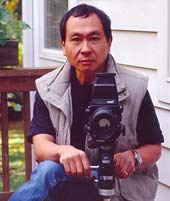 In 2006, as Iraq spiraled ever further out of the Bush administration's control, the neoconservative intellectual consensus behind the U.S. invasion began to come apart. That year, a leading American neoconservative, Francis Fukuyama, published America at the Crossroads: Democracy, Power, and the Neoconservative Legacy, in which he broke from neoconservativism.
In 2006, as Iraq spiraled ever further out of the Bush administration's control, the neoconservative intellectual consensus behind the U.S. invasion began to come apart. That year, a leading American neoconservative, Francis Fukuyama, published America at the Crossroads: Democracy, Power, and the Neoconservative Legacy, in which he broke from neoconservativism.
Once in 1998 and again in 2001, after September 11, Fukuyama signed open letters urging military action be taken to remove Saddam Hussein from power. "Failure to undertake such an effort," the 2001 letter to President Bush warned, "will constitute an early and perhaps decisive surrender in the war on international terrorism." America at the Crossroads served as his mea culpa, albeit one that required that he airbrush his advocacy of U.S. military action in Iraq after 9/11. Click here to read the letter.
In his 2006 America at the Crossroads, Fukuyama argued that the neoconservative error in Iraq came from believing that the organic internal process of national development — of rising prosperity, changing social values, and increasing democracy — could be accelerated through military means.
Fukuyama's post hoc discussion of Iraq is correct, but when it comes to the global warming, Fukuyama blinks. In his 1993 book he dismisses ecological concerns altogether. And in the 2006 afterward to The End of History, Fukuyama endorses the market fundamentalist's argument that avoiding the worst effects of global warming through making the transition to clean energy simply cannot be achieved without harming the economy.
Rep. Jay Inslee
 Rep. Jay Inslee had the idea for a new Apollo project at the same time as many of us did. As the Congressman representing the high-tech district of Seattle, home to Microsoft, Real Networks, and many other companies, Rep. Inslee knew that major public investments in the 1950s, 60s, and 70s were crucial to creating the high-tech and computer industries. In 2003, Rep. Inslee introduced his "New Apollo Project for Energy" into the House of Representatives.
Rep. Jay Inslee had the idea for a new Apollo project at the same time as many of us did. As the Congressman representing the high-tech district of Seattle, home to Microsoft, Real Networks, and many other companies, Rep. Inslee knew that major public investments in the 1950s, 60s, and 70s were crucial to creating the high-tech and computer industries. In 2003, Rep. Inslee introduced his "New Apollo Project for Energy" into the House of Representatives.
